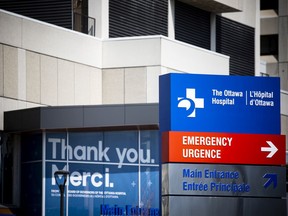The move is aimed at increasing access to care, improving care and reducing physician burnout, say hospital officials.
Article content
The Ottawa Hospital is set to become the first in Canada to begin using artificial intelligence to help physicians take notes during meetings with patients — likely the first step in what will become the broader use of AI throughout the hospital, said Chief of Staff Dr. Virginia Roth.
The AI tool will record meetings with patients, with their consent, and draft clinical notes that will later be reviewed and edited or approved by physicians before becoming part of the patient’s electronic medical record.
Advertisement 2
Article content
Article content
The move is aimed at increasing access to care, improving care and reducing physician burnout, say hospital officials.
Roth said physicians currently must decide whether to “carry on a natural human conversation” with patients, or whether to turn to their computer and try to capture what the patient is saying while it is fresh in their minds.
“Many of us try to do a little bit of both,” she said, but at the end of a long day, some details can be lost.
Roth said the intention of the new system, Microsoft’s DAX Copilot, is that it will capture what patients are saying, “so nothing is overlooked.”
“Most of us went into medicine because we like that relational aspect — actually seeing and talking to patients and families, and not typing things into a computer,” said Roth.
Both are important to patient care, she said, as is making sure physicians have more time to see patients and less time doing paperwork.
The Canadian Medical Association has estimated that most doctors spend at least 10 hours a week on paperwork (for family physicians, it is closer to 20 hours). Doctors often end their days by putting together clinical notes based on what they have written down and what they remember from consultations with patients.
Advertisement 3
Article content
The DAX Copilot system is being launched as a pilot project in select parts of The Ottawa Hospital, including its busy emergency departments. Roth said the hope is that the system will enable physicians to see more patients, which will improve wait times and patient flow. The hospital will measure the impact of the system before expanding its use.
“The more time emergency doctors can spend seeing and caring for patients and the less on documentation, we are confident it will improve wait times.”
There are some 1,400 physicians who work in the multi-campus hospital for various reasons, she said.
The use of artificial intelligence in health care is expected to explode in the coming years. While The Ottawa Hospital will be the first in Canada to use the DAX Copilot system, it is currently being used by some hospitals in the United States. There are numerous AI applications being studied and used throughout health care, and many more are in the works.
But amid the anticipation about AI and the future of medicine, there is also wariness by some who fear artificial intelligence could replace doctors.
Advertisement 4
Article content
Roth acknowledged the term artificial intelligence can invoke concern and fear in some, “which is why we are doing this thoughtfully and carefully.” That includes due diligence to protect privacy. Patients are asked for consent before their appointments are recorded using the system. The notes are stored securely, she said.
She noted that physicians, at the end of the day, review and sign off on the draft clinical notes created through the system.
“The point is to use technology to improve the care that the person is getting and the physician ultimately has to confirm the accuracy, so we are not letting a robot decide what goes into a patient’s chart.”
Recommended from Editorial
-

Non-profit that helps sex offenders rejoin society knows its mission is “a tough sell”
-

Deal in the works for possible sale of Yangtze restaurant in Chinatown: BIA
Article content




